Cracker Barrel CEO Julie Felss Masino recently gave a devastatingly frank assessment of the brand: “We’re just not as relevant as we once were.”
Masino, who became CEO in July, laid out the diagnosis — and the remedies — in a May presentation to analysts. And it raises questions for those accustomed to the brand’s biscuits and gravy, wooden tables and chairs, brain puzzler games and front porch rocking chairs.
“The way we communicate, the things on the menu, the way the stores look and feel … all of these things came up time and time again in our research as opportunities for us to really regain relevancy,” she said.
The revamped Cracker Barrel Old Country Store (the brand’s full name) could include remodeled restaurants with bookcases instead of lattice dividers and brand new banquette seating. New Cracker Barrels might be smaller restaurants altogether, with menus that include new items like green chili cornbread and banana pudding. Customers may see brighter interiors with simpler decor, a move away from the typical cozy clutter.
Those changes are still just being tested. One new thing happening now? Discounted dinner from 4 to 6 p.m.
Why would Cracker Barrel, so desperate for relevancy, lean into a tactic typically used to attract senior citizens? Partially because many people are eating early these days. And partially because it’s looking for a quick fix.
Cracker Barrel, which first opened in 1969, has long billed itself as a roadside place where weary travelers can stop for a hearty meal in a homey dining room, and also pick from a large selection of knick knacks at its country store. That pitch, which has in the past largely appealed to Baby Boomers, hasn’t resonated very well since the pandemic.
Last year, when other diners returned to restaurants after the early pandemic years, Cracker Barrel’s older clientele remained cautious, visiting the chain less often. Now, its retail stores are taking a hit as consumers pull back on spending. Those same dynamics are playing out in its restaurants.
In the three months ended on April 26, Cracker Barrel’s total revenue fell 1.9% compared to the year before, the company reported Thursday. Retail sales at stores open at least 18 months fell 3.8%, while restaurant sales fell 1.5%.
Wall Street has not been impressed: The company’s stock has declined nearly 37% this year, and has plunged about 70% over the past five years. The Tennessee-based chain owns its roughly 660 locations, which can be found throughout the country.
These new early-bird deals, which launched in February, are available Monday through Friday from 4 to 6 pm. They start at $8.99 and include reduced portions of Cracker Barrel’s signature country comfort food, like meatloaf and chicken.
Masino didn’t explicitly mention the specials during the discussion about the long-term strategy for Cracker Barrel. But she did point to the offering during the company’s earnings call on Thursday. It “is a big piece of our overall pricing strategy,” Masino said.
In some ways, an early bird special is a perfect solution — it may appeal to both Covid-cautious seniors on a budget and younger consumers who are eating earlier.
“Six o’clock is the new eight o’clock,” said Lisa W. Miller, a consumer strategist who has consulted for large restaurant chains through her company, Lisa W. Miller & Associates. “That four to six time period … can attract a younger family, as well.” The Wall Street Journal declared over the summer that “America is becoming a nation of early birds.” And in recent years, late night dining options have dwindled.
Fewer people visited Cracker Barrel before 9 AM and after 6 PM in the first quarter this year compared to that period in 2019, according to data from Placer.ai, which uses location data from mobile devices to estimate visits to specific restaurants and retail locations. Instead, the chain has “seen an increase in late morning and lunch visits,” said RJ Hottovy, head of analytical research at Placer.ai. It’s also seen an increase in the late afternoon, but a smaller one. The discrepancy “may explain the emphasis on early-bird specials,” he said.
Enticing younger consumers during that earlier period will depend somewhat on how the company advertises the deal, noted Miller. “It’s all going to depend … on the creative executions — how are they going after it?”
Masino said Thursday that Cracker Barrel was so eager to rush out the promotion that it only recently started advertising the special.
But breaking the association between early dinners and senior citizens will be hard, said John A. Gordon, founder and CEO of Pacific Management Consulting Group, a restaurant consultancy.
“It’s so well known in this country that seniors go out to eat earlier,” he said. “Although that’s changing … it is burned into people’s psyche, that that is designated for seniors.”
The company expects it to take years to revamp its brand, operations and restaurant models. But it needs to start improving sales sooner. And right now, consumers want deals.
Fast food companies are once again battling over dollars and cents, with many rolling out $5 bundles. Casual dining restaurants like Chili’s and Applebee’s are vying for customers with their own specials.
To compete in this environment, Cracker Barrel realizes it has to offer some type of deal. It seems to have decided that early dinners are the way to go.
There is a risk, said Gordon, that the offering could prove too popular. If too many people opt to eat dinner at reduced prices, margins and profitability will suffer.
“They run the Red Lobster risk here,” he said. “That they put in something too popular and then they get overwhelmed with it.“
Read the full article here
